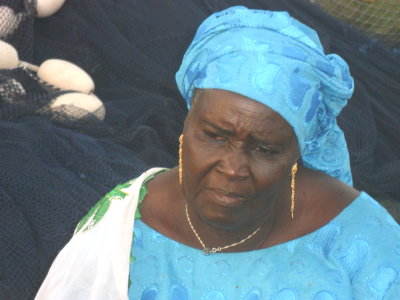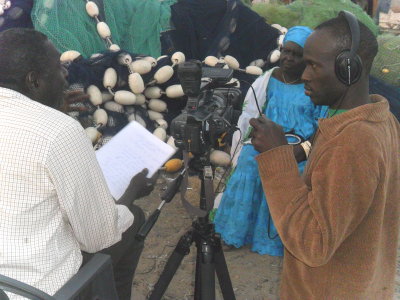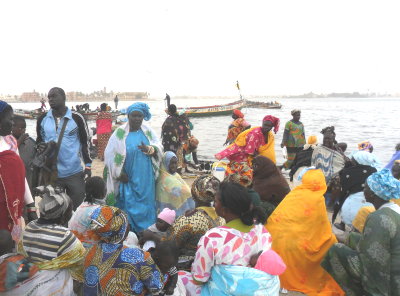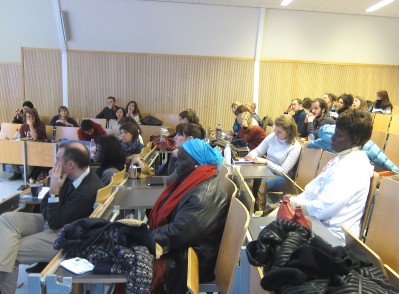Cine-debate "Awa SEYE - leader of women in artisanal fisheries in Senegal"

Look behind the scenes of the traditional fishing village Guet Ndar, Saint Louis, Senegal. The leader of the women active in the traditional fishery and strong personality in the community is Awa SEYE. Follow her through the interview, discover her working environment and social struggles and talk to the real persona.
Her rise from a down-trodden woman suffering loss of several babies in child birth to a leading midwife, community organiser and successful defender of the women's access rights to their working spaces on the beach against tourism developpers cast some light on what can be achieved with determination, social responsibility and civic engagement. As part of the Mundus mariscontribution to the 2013 edition of Campus Plein Sud at the ULB, join the cine-débate in the course of Prof. Gemenne, 13 March 2013, from 17h00 to 18h00 in Room AY2.108 - Solbosch Campus.
This event follows on from an open course of Prof. Gemenne titled "Water, Food, Biodiversity : conflicts over the land", 14h00-17h00, Room: AY2.108 - Solbosch Campus
 Most fittingly, the following cine-debate with projection of the video-interview will start at 17h00 to provide first hand illustration for some of the issues raised in the course.
Most fittingly, the following cine-debate with projection of the video-interview will start at 17h00 to provide first hand illustration for some of the issues raised in the course.
The title of the video is "Awa SEYE - leader of women in artisanal fisheries in Senegal"
Description: This woman in her sixties has a life journey full of lessons thanks to her tireless commitment to her own community and those on the coast at the cross-roads of the social, economic and environmental challenges. She represents the determination, especially of the women, not to accept everything and defend their rights to the beach as a place for fish processing against the interests of coastal tourism. They are all working hard to improve their lives through access to training and social organisation.
 Format: Projection of the video interview with Awa SEYE, followed by a discussion with the protagonist to provide access to an unfiltered, direct voice of the social actress herself, and enable the exchange with her.
Format: Projection of the video interview with Awa SEYE, followed by a discussion with the protagonist to provide access to an unfiltered, direct voice of the social actress herself, and enable the exchange with her.
The video-interview was directed by Mor Talla Ndione, the questions were posed by Aliou Sall.
In the master course of Prof Gemenne the students were already expecting the video-interview. They followed the footage attentively, as it gave them a vivid impression about some of the ground realities in the fishing village and confront this with more conceptual approaches, which are the backbone of the study. The interview underlined the commitment of Awa Seye not only to aleviate the plight of the women, but cater for the needs of the entire village and address the structural problems in the fisheries.
The subsequent discussion moderated by Aliou Sall, a social anthropologist with many years experience in the Senegalese and West African fisheries, was an excellent opportunity to check out doubts and questions.
 He interpreted for Awa Seye so that her native Wolof was not an obstacle to communication. He often checked back with Awa to make sure he was giving a faithful response on her behalf to the questions and comments of the students. The student were happy to seize to get it "from the horse's mouth".
He interpreted for Awa Seye so that her native Wolof was not an obstacle to communication. He often checked back with Awa to make sure he was giving a faithful response on her behalf to the questions and comments of the students. The student were happy to seize to get it "from the horse's mouth".
In the interaction with Awa as municipal adviser and community leader, the students got a more nuanced perspective on development.
Studying the many facets of local context in the light of the going development concepts was essential to look for the connections between these two sides of the same coin. Both sides became more aware of the other's context, a first step to be able to create some shared understanding.
Click here for viewing the video.
Look also at the bonus material from the film crew, when they visited Awa SEYE at her home in the traditional fishing village of Guet Ndar, separated from the historical centre of Saint Louis in northern Senegal by a bridge over one of the arms of the Senegal River delta









